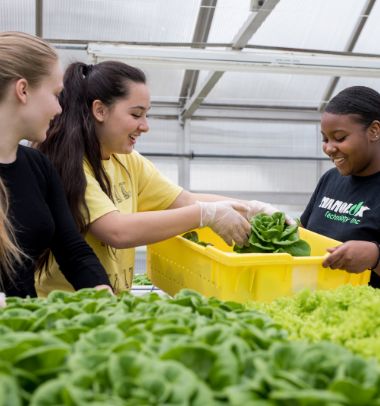This article originally appeared on Edible Charlotte.
In a woodsy kitchen just off East Boulevard in Dilworth, Ron Morgan, Sam Fleming and Charlie Oliphant of 100 Gardens are heating up a gray misty morning with yet another passionate discussion about fish.
“Koi don’t seem nearly as intelligent as tilapia,” Fleming is saying. A darkly bearded 20-something with intense eyes, he sits hunched beside the rustic dining table, nursing a mug of high-test black coffee. “I’ve been watching them in my aquarium, and the koi just swim around and bump into the glass. The tilapia wait, and watch—and then attack!”
Morgan, tall and lean in a black shirt and jeans, looking every inch the architect and artist, stands sentry-straight by the sink and scratches his chin thoughtfully. “Yes, actually, koi aren’t terribly personable. I just can’t get their attention.”
Oliphant, an affable Charlotte CPA who grew up on a family farm in Utah, leans back in his chair, soaking it all in, as Morgan’s wife walks into the kitchen and right back out again.
For Morgan, an urban visionary originally from Berkeley, California, 100 Gardens is a tool to bring lasting change to Haiti, long the most-impoverished nation in the Americas. In the process, he believes it can link the people of Charlotte and Haiti, transforming both for the better.
100 Gardens is based on “aquaponics,” a food production system that combines raising fish with producing vegetables (see Aquaponics 101, p. 32). Like other natural ecosystems, aquaponics depends on diverse organisms working together and adapting to changing conditions. 100 Gardens planning and decision-making seem to work in much the same way. The trio’s discussions range far beyond finny personalities and geeky gab fests on finer technical points.
The seeds for this hopeful initiative, Morgan says, grew from despair. He visited Haiti with a delegation from Steele Creek Presbyterian Church after the earthquake of 2010 devastated the country: a staggering 616,000 people were killed or injured, a number equal to the total population of the state of Vermont. Over a million people, the entire population of Mecklenburg County, became homeless.
“I was overwhelmed by the experience,” Morgan remembers. “The whole damn city went down, there were three mil- lion people on the streets and in tent camps, two-thirds of the buildings were down. NGOs [non-governmental organizations] were building shacks, but it wasn’t working.”
Morgan realized that long-term, sustainable solutions would have to start with ways for the Haitians to feed themselves and earn a livelihood, but he knew little about agriculture. One night, sitting at the Comet Grill on Park Road listening to a bluegrass band, he began complaining out loud about his frustration, when a stranger at the next table leaned over and said, “Hey, you need to meet George.”
“FULL-BLOWN GENIUS”
George turned out to be George Powell, a Comet Grill regular who’d owned and operated a hydroponic greenhouse operation near Mint Hill. (Hydroponics is a growing method that cultivates plants in water, without soil.) Powell and Morgan began to collaborate on sketches and plans that laid the groundwork for a portable hydroponic vegetable-growing project, one that could bring food and hope to Haiti, and at the same time work as a teaching tool for schools in Charlotte.
Morgan calls Powell a “full-blown genius—with a wire or two disconnected.” Powell, who’d hit hard times and become homeless, moved into Morgan’s house. The two men worked together intensely on a design until Powell moved on, a couple weeks later. Then, Powell was diagnosed with terminal cancer. In four months, he was dead.
Powell’s death left Morgan with sketches, notes and a burning passion to move ahead, but still insufficient expertise. On a whim one rainy morning, he decided to visit a Charlotte hydroponics store to seek advice. Behind the counter was Sam Fleming. Morgan, who has a gift for constructing narratives, says Fleming abandoned his post and, like a new disciple, immediately hopped in the car to go visit the prototype project.
Fleming, four decades Morgan’s junior, remembers it a bit differently.
He recalls talking with Morgan and politely hearing him out, but then Googling him after he left. What he found was a man with a long and illustrious record over three decades at his urban design firm, Charlotte Ventures.
Both Morgan and Fleming agree on one thing: once Fleming had heard the story and looked at the sketches and the mock up, which Morgan named “George’s Garden” in honor of his late friend and collaborator, the young Charlotte native crossed his arms and gave Morgan that intense look.
“Man, what you’re trying to do here is really important. If you want, I’ll quit my job and help you make this thing happen.” (His former boss gave him the aquarium tank he now uses for observing fish.)
Fleming brought with him openness to a new idea that George Powell had resisted: why not integrate fish into the system?
USING FISH TO GROW VEGETABLES
“Aquaponics began after someone noticed that the waste water from aquacultural fish ponds—considered a waste product—contained almost exactly the same nutrient profile as those expensive soluble fertilizer blends we sold for hydroponic greenhouses,” Fleming explains.
It was back to the books for 100 Gardens, as the project began to evolve from hydroponics to aquaponics. Fleming, who met and studied with Dr. James Rakocy, the “Father of Aquaponics,” can now hold forth like a PhD on nitrogen dynamics, tilapia stocking rates, and root growth dynamics. Not bad at all for a kid who plays in a rock band.
Morgan, meanwhile, visited “Growing Power,” the aquaponic project created by Milwaukee activist Will Allen. While he recognizes Allen’s gifts as a visionary and urban agriculture pioneer, Morgan’s inner artist wasn’t impressed.
“I don’t know, it doesn’t look very attractive. I want to design something that is both beautiful and functional.”
As 100 Garden’s design and technical work continued, the group kept up the search for local partners. Morgan recruited Oliphant, a former co-worker, who brought both accounting skills and a farm boy’s ability to build or fix just about anything. Morgan credits Cynthia Marshall, long-time head of Communities In Schools of Charlotte- Mecklenburg who retired in 2006, as an indispensable resource for connecting with the community. Little by little, word of 100 Gardens began to spread.
100 Gardens’ underlying strategy is to set up cooperative aquaponic farms, organized in threes. Two schools or other appropriate host sites in Charlotte—or elsewhere in the United States—will each build a 100 Gardens aqua- culture unit, staying in touch with one another and providing mutual support. Then this pair will cooperate to fund and set up a third unit at a location in Haiti. The trio will work together closely and also join the larger 100 Gar- dens network. Their ultimate goal is 33 aquaponic gardens in Haiti, supported by 66 partner gardens in the United States (even CPA Oliphant doesn’t fret about the inexact math).
On the US side, 100 Gardens is off to a good start with the artistically-designed first unit beside Morgan’s house. Its small windmill tower, decorated with Haitian angels, fits well in the upscale/hip Dilworth viewscape. There are a number of other sites under discussion. Johnson C. Smith, which is a 100 Gardens partner, has already opted to purchase a commercial aquaponics unit. Others will be created from scratch. 100 Garden’s flagship project, with- out a doubt, is the demonstration unit now under construction at Concord’s Stonewall Jackson School, where they are transforming an old, 100-foot-long greenhouse on the Jackson property into an aquaponic research facility and model for future projects.
Powell’s ghost still haunts 100 Gardens. Haiti, too, has ghosts that haunt its past, though most not as saintly as Powell. And that country, too, has had more than its share of tragedy.
BREAKING THE CYCLE OF PERPETUAL CRISIS
“Things never went the right direction for Haiti. In spite of independence, Haiti has always been under the influence of other countries. And we have our own internal issues that are part of the problem, too,” says Luiguy Massanga, a stylish, serious gentleman in his 40s wearing a scarf on this chilly afternoon.
Massanga is the co-founder of Joseph’s Exchange, a Charlotte-based organization dedicated to supporting the Haiti Missions Service (HMS), where he is also a minister. He serves as liaison to 100 Gardens.
When we met at the Billy Graham Library to talk, where an old barn has been transformed into a spacious museum and cafeteria space, he brought along Sandy Matharin, a 22-year-old Haitian student who is studying public health at Johnson C. Smith under a scholarship that grew out of contacts made through 100 Gardens.
(At the Graham Library, we found unanticipated distractions: an unsettling- ly realistic animatronic talking cow by the front door; and there, standing in the middle of everything was Dr. Newt Gingrich, former Speaker of the US House of Representatives. Gazing into the distance, Gingrich shook hands cordially with everyone, never uttering a word.)
Massanga spoke eloquently and sadly about Haiti’s difficult past and the devastating earthquake. HMS faced the immediate challenge of helping its church members in Port-au-Prince cope with the crisis. They relocated 5000 affected people to a church-owned camp 30 miles north of Port-au-Prince, where they set up a tent city, helped meet basic needs, then started struggling with the question of what to do next.
Looking at the ineffectiveness of large charity NGOs and current Haitian pol- icy—a crisis within the crisis that’s been pointed out by Oxfam, Doctors Without Borders and other highly regarded aid organizations—HMS reached the same conclusion as Ron Morgan: This isn’t working.
“We have a group of different NGOs, but no cohesive and self-sustaining approach.” Massanga says. “Haiti is still in very precarious condition. This is is wonderful for the NGOs, but not for the Haitian people. We decided to build for the future. There are already lots of institutions dealing with the crisis. If you spend your life dealing with crises, then you’ll deal with crises for the rest of your life.”
After prayer and brainstorming, HMS decided the best strategy was a fresh start. They would build Mahanaim, their innovative village, on the church camp property. It would be designed from scratch to provide their members with an alternative to Port-au-Prince and other cities.
Mahanaim’s proposed design matched Ron Morgan’s expansive vi- sion so closely that Morgan immediately grasped the connections and potential for partnership. He has helped create an urban plan for the project.
The first Haitian 100 Gardens aquaponics unit will be located at Mahanaim. Massanga sees the aquaponics as a small part of a much larger picture, though Morgan’s design for Mahanaim’s village square shows an expansive aquaponic unit boldly filling fully half of the town square, as Fleming gleefully noticed while visiting the site online. Morgan wants to see food production woven into the fabric of everyday life.
The partners do have some differences in perspective, something Massanga and Morgan both view as a factor that strengthens the project overall. Mahanaim is intentionally located away from Port-au-Prince.
Morgan sees it differently, at least for the 100 Gardens units. He says they must also be able to work in cities and urban communities, since that’s where most people live and where they are likely to stay.
Regardless, 100 Gardens and Mahanaim both seeks to become models that others can reproduce successfully, to make a positive dif- ference throughout the world.
“If it works in Haiti,” Massanga says with a wry smile, “It will work anywhere!”
Judging from progress at the Stonewall Jackson School, which is managed by North Carolina’s Department of Justice, 100 Gardens has a fighting chance of reaching their ambitious goal.
There’s a palpable sense of excitement as construction nears comple- tion and it gets closer and closer to the day when they’ll plant crops and add the first fish to the tanks. But the 100 Gardens team members recognize all too well the challenges that lie ahead. Fish can get sick from infections, a power failure can cause havoc, and there are the same daunting marketing challenges facing any small farmer. On top of that is the education component—coming up with lessons, both practical and academic, for the Stonewall Jackson students, who will ultimately have to run the system on their own and provide advice and support for their partners in Haiti.
Sound complex? The 100 Gardeners team is undaunted; tackling these kinds of problems hands-on is key to creating a viable and sustainable model. Running a real-world unit offers lessons only experience can teach, a factor doubly true in farming. At Jackson, these are no longer academic questions, with fish going in within a few weeks. Fleming and his partners have to weigh the pros and cons, and make their own decisions. Now.
Besides, farmers and gardeners face a version of this challenge every day, whether they are tending a patch of spinach, running a dairy, or managing an aquaponics setup growing koi and tomatoes. And there is already interest in aquaponics growing in Haiti. A quick overview via the Internet shows several other aquaponics projects already in place and off to a reasonably good start, as well as firmly-established tilapia farming, both in the cities and the countryside.
In the face of all the daunting challenges it hopes to address, 100 Gardens offers infectious enthusiasm, a refreshingly positive can-do attitude, and a proven ability to learn, adapt and change. The problems, in our food systems or otherwise, in Haiti or in Charlotte, can’t be solved if we just keep doing the same things that aren’t working, or worse, give up and do nothing at all.
“The key word is ‘hope,’” Massanga says. “You have to adapt to the situation, but focus on doing, not talking about it. There’s a Haitian proverb, to the effect of ‘Don’t say what you are going to do—people will talk. Just do.’”



